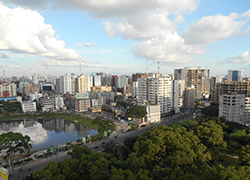Risk, Savings, and Rural-Urban Migration in the Developing World
Researcher: David Lagakos (UC San Diego)
Location: Bangladesh
 In developing countries there is typically a large gap in income between urban and rural dwellers. When rural people migrate to urban areas they often earn a higher income. However there are risks involved in migrating to cities, one being insufficient methods of savings.
In developing countries there is typically a large gap in income between urban and rural dwellers. When rural people migrate to urban areas they often earn a higher income. However there are risks involved in migrating to cities, one being insufficient methods of savings.
This study seeks to understand whether savings constraints prevent people in rural areas of developing countries from migrating and taking advantage of the large gains in wages and productivity associated with a move to cities. The project will calibrate a dynamic model of savings and migration decisions using a randomized controlled trial that successfully encourages migration, combined with rich micro data on income and savings of rural-urban migrants in Bangladesh, in order to study the links between access to savings and the decision to migrate.
Results are expected to show improved savings instruments will help mitigate the risk of migration from rural to urban areas. Whether savings constraints affect the spatial distribution of economic activity and the growth of cities in developing countries is of first-order importance for growth policy, but the micro-macro framework the project builds will also more broadly shed light on the links between savings and technology adoption.

